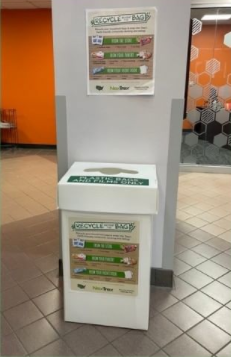In the bag: New soft plastic recycling bins expand recycling options
Office of Sustainability works toward recycling Climate Action Commitment goals

The Office of Sustainability’s Waste Management Student Intern Team is unveiling a new soft plastic recycling pilot program in support of Virginia Tech’s Climate Action Commitment goal of achieving zero-waste campus status by 2030.
The product of a partnership between the Office of Sustainability within the Division of Campus Planning, Infrastructure, and Facilities and Virginia Tech Housing and Residence Life, the three new recycling bins — located in Squires Student Center, Ambler-Johnston commons, and the Creativity and Innovation District Living-Learning Program — accept a range of soft plastics, including plastic grocery bags, single-use sandwich bags, cereal bags, and more.
Most recycling bins on the Blacksburg campus are only meant to collect plastics that are coded one and two, such as bottles and food containers. When other types of plastics, such as grocery bags, end up mixed into these bins, it contributes to waste contamination within the recycling stream, can slow down recycling operations, or cause properly recycled items to be thrown out due to contamination.
Student interns experienced this dilemma firsthand on a tour of Recycling and Disposal Solutions (RDS) last semester, the Roanoke facility where recycling from the Blacksburg campus and the New River Valley is processed.


“Contamination in the waste stream is one of the main problems that we're working on improving within the Virginia Tech community. The facility tour really highlighted the need for clear labeling on our recycling containers, standalone soft plastic recycling bins, and more consumer education. We learned that machinery can be shut down for hours due to recycling contamination,” said Madison Norman, a sophomore majoring in environmental conservation and society within the College of Natural Resources and the Environment and leader of the Waste Management Student Intern Team.
“The new bins collect everything — grocery bags, bubble wrap, newspaper sleeves, produce bags, Ziploc bags, cereal bags – just a lot more plastic than is able to go to the RDS facility currently. People think you can recycle any plastic within one bin, when in reality that isn’t the case. Now we are able to collect more of those plastics and recycle them, which is something we weren't able to do beforehand," added Norman.
“We're also currently working closely with Emily Vollmer, sustainability coordinator, to create a label log, looking at academic buildings on campus and identifying whether their bins have updated stickers for recycling or if they're outdated, hard to read, scratched up –– anything like that. We are addressing contaminate in the waste stream and seeing how we can decrease that on campus to better help the RDS facility. If recycling matter has a certain amount of contamination in each ton of recycled material, then it can't be used, which defeats the purpose of recycling certain products,” said Norman.
“Our hope is that if the university community understands what items can and cannot be recycled, then they will likely put fewer non-recyclable things into the recycling. That way, we can improve our numbers on waste contamination,” said Lauren Maunder, a junior double majoring in national security and foreign affairs and Russian within the College of Liberal Arts and Human Sciences and Waste Management Intern Team participant.

“We are enthusiastic about the prospect of the plastic bag pilot program’s continued success throughout the rest of the semester and future growth opportunities for the program across the Blacksburg campus. Everyday life choices – like recycling plastic bags – can really add up to substantial change universitywide,” said Blake Bensman, sustainability manager for Housing and Residence Life.
The Waste Management Student Intern Team is currently tracking the number of items collected and the weight of the bins to measure success; it hopes to collect 6,500 individual items or 150 pounds of soft plastic.
“The goal is to have a cleaner and more sustainable campus, and recycling is an easy step that each one of us can take to contribute. Everyone who wants to get involved or feel like they are part of reaching that goal can do so by participating in this collection and making a difference, even on a small scale,” said Norman.




